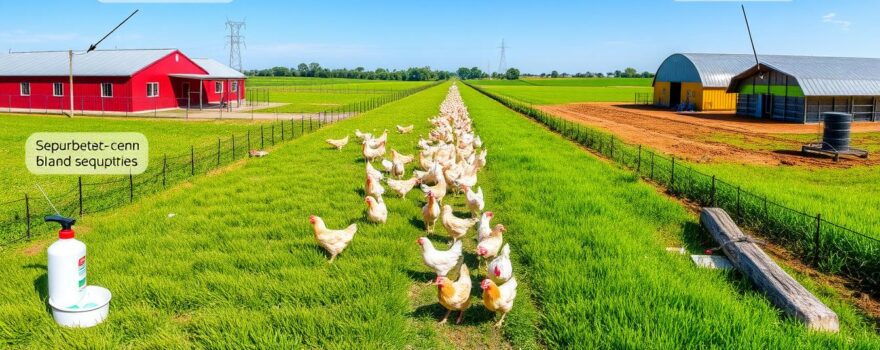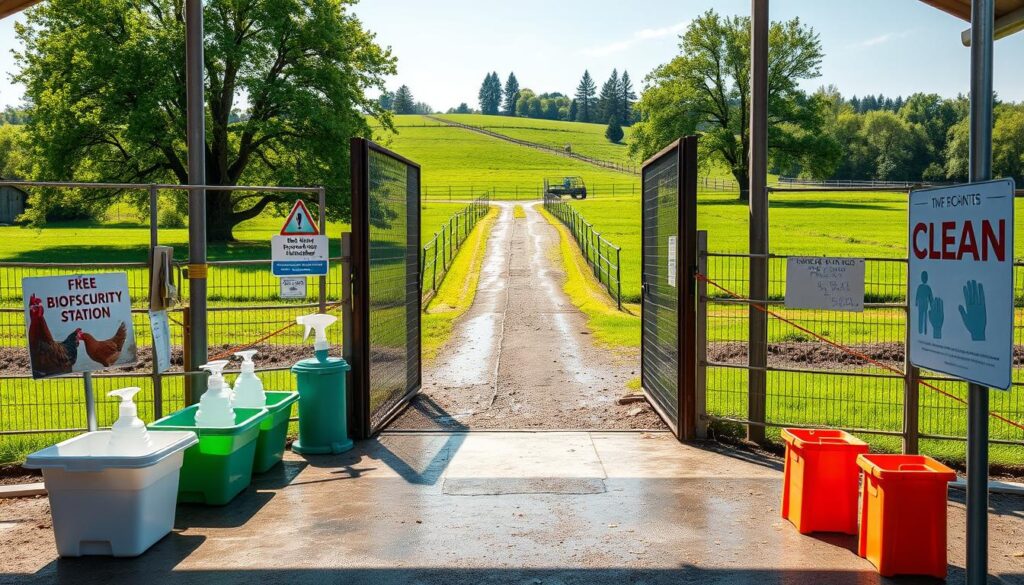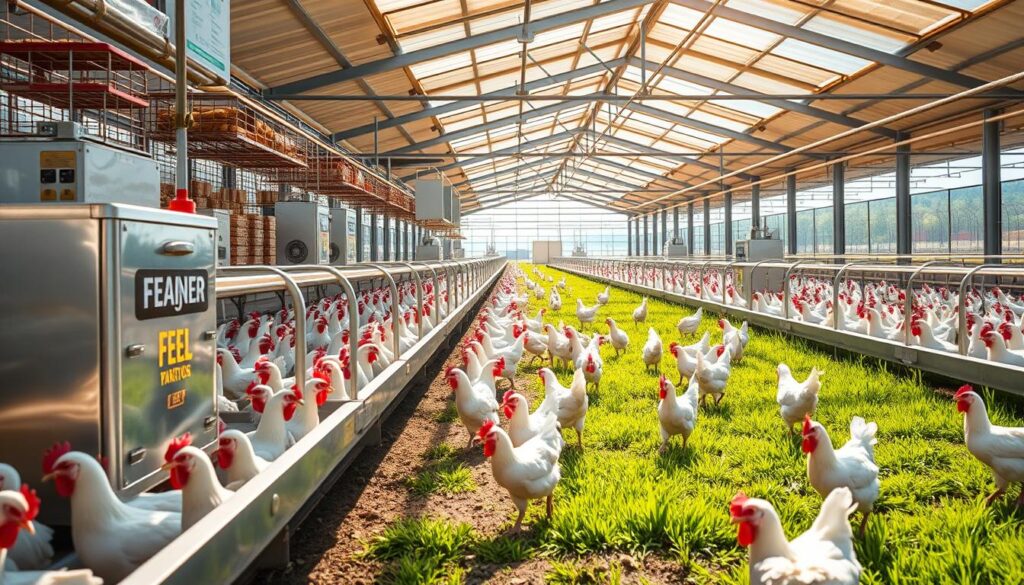
In the fast-paced poultry world, keeping strong biosecurity is key. It keeps broiler flocks healthy, ensures food safety, and boosts farm productivity. This guide covers the top strategies and practices for better biosecurity in broiler farms.
It talks about setting strict rules, controlling who enters the farm, and keeping everything clean. It’s a detailed plan for farmers to improve their biosecurity. This helps prevent diseases and keeps the farm clean.
Key Takeaways
- Understand the importance of biosecurity in the poultry industry and the challenges of inadequate measures
- Learn how to implement effective biosecurity protocols, including visitor management and disinfection practices
- Discover strategies for monitoring flock health and maintaining farm infrastructure to support disease prevention
- Explore the integration of animal welfare standards to ensure the humane treatment of broilers
- Recognize the value of collaboration and ongoing training for continuous improvement in biosecurity
Introduction to Biosecurity in Broiler Farms
Biosecurity is key to a healthy poultry industry. In broiler farms, it’s vital to keep birds safe and food safe. It also helps meet animal welfare standards.
By focusing on biosecurity, farms can avoid big disease problems. This boosts productivity and keeps farms in line with rules.
Importance of Biosecurity in the Poultry Industry
The poultry industry is a big source of protein for people all over. Biosecurity protocols are crucial to stop diseases. These diseases can harm birds, make food unsafe, and hurt poultry farm hygiene.
Good biosecurity keeps birds healthy. It also helps farms stay profitable and sustainable.
Challenges and Risks of Inadequate Biosecurity Measures
Many broiler farms struggle with disease prevention. If biosecurity is weak, diseases can spread fast. This can cause big losses and break rules.
Not focusing on biosecurity protocols can harm the whole poultry industry. It can also make people doubt the safety and quality of poultry products.
| Biosecurity Measure | Benefit |
|---|---|
| Strict access control and visitor management | Prevents the introduction of pathogens from external sources |
| Rigorous cleaning and disinfection of equipment and facilities | Eliminates potential sources of disease-causing agents |
| Comprehensive disease monitoring and surveillance | Enables early detection and rapid response to health threats |
“Effective biosecurity is the cornerstone of a thriving poultry industry, safeguarding the health and well-being of our flocks and ensuring the production of safe, high-quality poultry products.”
How to Implement Effective Biosecurity Measures in Broiler Farms
Keeping your broiler farm safe from diseases is key. It helps protect your birds and keeps your farm running well. To do this, you need a solid plan that covers many areas of farm management. Let’s look at the main steps to make a strong biosecurity plan for your farm.
Establish Strict Farm Access Controls
Keeping unwanted visitors out is your first defense. You should have a system for managing who comes in. This includes:
- Everyone, including staff, must sign in and out.
- Make sure visitors wear clean protective gear like coveralls and gloves.
- Have a strict hand-washing and disinfection rule at the entrance.
- Only let necessary people in and limit vehicle and equipment movement.
Prioritize Cleaning and Disinfection
Cleanliness and disinfection are key to stopping disease spread. Here’s what to do:
- Regularly clean and disinfect equipment, vehicles, and buildings.
- Dispose of waste and dead birds properly to avoid contamination.
- Use approved disinfectants and follow the instructions for best results.
- Keep the air and humidity right to make it hard for pathogens to survive.
Implement Proactive Flock Health Monitoring
Watching your flock’s health closely is vital. You need a plan that includes:
- Regularly check and watch over your broiler flock.
- Work with vets to create a vaccination and treatment plan.
- Keep detailed records of your flock’s health, deaths, and any disease outbreaks.
- Use biosecurity steps like separating sick birds and controlling movement.
By following these steps, you can make your biosecurity better. This will help keep your birds healthy and your farm productive.
Establishing Strict Biosecurity Protocols
Keeping broiler farms safe from diseases is key. A good biosecurity plan is essential for your flock’s health. It helps prevent diseases from spreading.
Developing a Comprehensive Biosecurity Plan
A solid biosecurity plan covers all farm operations. It includes controlling who enters the farm and how to clean and disinfect. The plan should also detail how to manage visitors and keep the farm secure.
Training Farm Workers on Biosecurity Practices
Teaching farm workers about biosecurity protocols is vital. Everyone, from managers to workers, needs to know why biosecurity is important. They must also know how to follow the biosecurity protocols correctly.
- Offer detailed biosecurity training on hand hygiene, using PPE, and cleaning equipment.
- Make sure workers understand the rules and the risks of not following them.
- Keep the training up to date with new biosecurity challenges and best practices.
By having strict biosecurity protocols, you can lower disease risks. This ensures your broiler flock stays healthy and productive.
“Implementing effective biosecurity protocols is not just a best practice, but a critical responsibility for all broiler farm operators.”
Farm Entrance and Visitor Management
Keeping a strong visitor management system is key for poultry farm hygiene. It stops harmful pathogens from getting in. Good biosecurity at the entrance helps a lot in keeping the farm safe.
Setting up strict entry rules is a big step. Everyone, including farm workers, must wear protective gear like coveralls and gloves. Also, cleaning every vehicle before it enters can stop germs from spreading.
- Require all visitors to wear personal protective equipment (PPE)
- Implement a vehicle disinfection process at the farm entrance
- Maintain a detailed visitor log to track entry and exit
It’s also important to limit who comes to the farm. Only people who really need to be there, like vets or maintenance workers, should get in. Planning visits carefully can help avoid disease.
“Effective visitor management is a cornerstone of poultry farm biosecurity, protecting the health and well-being of the flock.”
By using these visitor management steps, broiler farms can keep their operations safe. This ensures the health and success of their birds.

Disinfection and Sanitation Practices
Keeping your broiler farm clean and disinfected is key to success. It keeps your birds healthy and prevents diseases. This ensures your poultry is safe and of high quality.
Cleaning and Disinfecting Farm Equipment
Cleaning and disinfecting farm gear is vital. This includes vehicles, tools, and buildings. It stops germs from spreading.
Use a detailed cleaning plan. Focus on areas where many people touch. Choose EPA-approved cleaners made for poultry farms.
Proper Handling and Disposal of Waste
Dealing with waste like dead birds, litter, and manure is crucial. A good waste system keeps the farm clean and safe. Follow local rules and best practices for waste disposal.
- Implement a comprehensive cleaning and disinfection protocol for all farm equipment and surfaces.
- Utilize EPA-approved disinfectants specifically formulated for the poultry industry.
- Establish a robust waste management system for the timely removal and safe disposal of carcasses, litter, and manure.
- Adhere to local regulations and best practices for waste handling to minimize environmental impact and disease transmission.
“Consistent disinfection and sanitation practices are the cornerstone of effective biosecurity in broiler farms. These efforts help protect the health and welfare of your flock, and ensure the safety and quality of your poultry products.”
Focus on disinfection and sanitation to boost your farm’s biosecurity. This protects your birds and keeps your poultry business running smoothly.
Disease Monitoring and Flock Health Management
Keeping the broiler flock healthy is key to good biosecurity in poultry farming. Regular checks and disease watch programs are crucial. They help spot illness early. This way, farmers can quickly stop infections from spreading and keep their operations running smoothly.
Regular Flock Inspections and Surveillance
Having a strong flock monitoring system is vital for preventing disease. Farmers should look over their broiler flocks every day. They should watch for odd behaviors, physical signs, or changes in how much they eat and drink. Also, regular tests like blood work and swabs can find pathogens or disease early.
- Conduct daily visual inspections of the broiler flock
- Monitor for any changes in feeding, drinking, or behavior patterns
- Perform regular diagnostic testing, including blood tests and environmental sampling
- Maintain detailed records of flock health and any observed issues
Finding health problems early is key to quick action. This includes using the right biosecurity steps and disease control. By being proactive in managing flock health, farmers can avoid disease outbreaks. This helps keep their operations productive and profitable.
“Effective disease monitoring and flock health management are the cornerstones of a robust biosecurity program in broiler farms. Proactive surveillance and timely intervention can make all the difference in preserving the well-being of the herd and the long-term success of the operation.”
Biosecurity in Feed and Water Supply
Keeping the feed and water supply clean is key to stopping diseases on broiler farms. By making sure these resources are of high quality, farms can lower the chance of harmful germs getting in. This helps keep the birds healthy.
Choosing the right ingredients for feed and water is important. Farms should pick suppliers who test their products well. This helps avoid diseases like salmonella and E. coli that can harm the birds.
Broiler farms also need to handle feed and water carefully. They should have clean storage places and follow strict cleaning rules. Keeping everything clean helps prevent diseases and keeps the birds safe.
| Best Practices for Feed and Water Biosecurity | Benefits |
|---|---|
|
|
By focusing on biosecurity in feed and water, farms can prevent diseases. This helps them stay successful and sustainable. Good biosecurity is a big part of managing a farm well.
Maintaining Farm Infrastructure and Equipment
Keeping your broiler farm’s infrastructure and equipment in top shape is key for good poultry farm hygiene and disinfection practices. Regular checks, repairs, and upgrades help keep your farm clean and safe. This protects the health and happiness of your birds.
It’s important to maintain your broiler houses well. This includes the ventilation and temperature control systems. Good airflow and temperature help your birds stay healthy. It also makes your disinfection practices more effective.
Cleaning and disinfecting all farm equipment is also crucial. This includes feeders, drinkers, and transport vehicles. A good cleaning routine and the right disinfectants can stop diseases from spreading.
Prioritizing Farm Infrastructure Maintenance
- Regularly inspect and repair broiler houses, ensuring proper ventilation and temperature control
- Implement a comprehensive cleaning and disinfection protocol for all farm equipment and machinery
- Upgrade or replace aging infrastructure to maintain optimal biosecurity and productivity
“Investing in the upkeep of your farm’s physical assets is a critical component of an effective biosecurity program. By maintaining a clean, well-functioning facility, you create an environment that is less susceptible to disease outbreaks and supports the overall health and performance of your broiler flock.”

By focusing on your farm’s infrastructure and equipment, you boost poultry farm hygiene. This helps your farm succeed in the long run. Regular care of these key areas leads to healthier birds, less disease, and more productivity.
Integrating Animal Welfare Standards
In the broiler farming industry, animal welfare is key. It’s not just a moral duty but also crucial for biosecurity. By treating broilers humanely, farms improve animal well-being and meet rules. This also boosts their reputation and sustainability.
Ensuring Humane Treatment of Broilers
Humane treatment of broilers requires a detailed approach. It covers their physical and mental health. This means giving them enough space, clean water, and food, along with vet care and a stress-free environment. These standards show a farm’s commitment to responsible and sustainable practices.
- Adequate living space: Allowing broilers to move freely and engage in natural behaviors, such as walking, flapping their wings, and dust bathing.
- Proper nutrition and hydration: Ensuring access to clean water and a balanced diet that meets the broilers’ nutritional needs.
- Veterinary care and disease prevention: Regularly monitoring flock health and providing prompt medical attention to maintain the well-being of the birds.
- Minimizing stress and promoting natural behaviors: Creating an environment that is free from excessive noise, overcrowding, and other stressors, and allowing broilers to engage in instinctual activities.
| Key Animal Welfare Indicator | Minimum Standard | Best Practice |
|---|---|---|
| Stocking Density | 42 kg/m² | 34 kg/m² |
| Litter Quality | Dry and friable | Dry, friable, and regularly replenished |
| Lighting | At least 6 hours of darkness per day | Gradual lighting transitions and access to natural light |
| Mortality Rate | Less than 4% | Less than 3% |
By adding these animal welfare standards to their biosecurity plans, broiler farms show they care. This improves their reputation and gains trust from consumers and regulators.
Collaboration and Information Sharing
In the world of broiler farming, working together and sharing information is key. Broiler farm owners who talk to other farmers, vets, and government agencies stay up-to-date. They learn about new ways to keep farms safe and healthy.
By sharing knowledge, farms can get better at keeping diseases away. This teamwork helps the whole poultry industry stay strong against diseases.
Staying Informed and Connected
Broiler farm owners should join in on industry events. These meetings are great for:
- Learning about new ways to stop diseases
- Sharing what works on their farms
- Working together to solve problems
- Talking to vets and government about new rules and dangers
By connecting and sharing, farms help the whole poultry industry. This makes the sector stronger and healthier for everyone.
| Collaboration Initiatives | Benefits |
|---|---|
| Industry-wide biosecurity workshops | Sharing of best practices and emerging threats |
| Regulatory agency outreach programs | Staying informed on policy changes and compliance |
| Peer-to-peer networking events | Peer support and problem-solving |
By working together and sharing, broiler farms make the industry safer. This helps farms stay healthy and profitable for a long time.
Continuous Improvement and Ongoing Training
Keeping biosecurity protocols strong on broiler farms is a never-ending task. It needs a strong commitment to always get better and keep training farm workers. Farm owners must always check and update their biosecurity steps. This is to stay ahead of new disease threats and the best ways to fight them.
It’s key to make learning a big part of the farm’s culture. By giving all farm staff ongoing training, broiler farms can help their workers spot and fix biosecurity problems early.
- Regular biosecurity refresher courses to reinforce key protocols and procedures
- Incorporating the latest industry research and recommendations into training curricula
- Hands-on demonstrations and simulations to improve worker competency
- Encouraging open communication and feedback from farm workers to identify areas for improvement
The success of a broiler farm’s biosecurity protocols relies on its workers’ watchfulness and hard work. By focusing on continuous improvement and ongoing training, broiler farms can build a strong biosecurity culture. This protects the health and productivity of their birds.
“Effective biosecurity is not a one-time exercise, but a continuous journey of learning and adaptation.”
Effective biosecurity measures are key for broiler farms to thrive. By using the strategies shared in this article, farms can keep their flocks safe and healthy. This also boosts productivity and ensures food safety.
It’s important to have strict biosecurity protocols and manage who enters the farm. Keeping the farm clean and monitoring flock health are also crucial. A strong biosecurity plan is vital for the poultry industry’s future.
By focusing on biosecurity, farms can create a safe and strong environment. This benefits both the animals and the community. It includes keeping diseases away, maintaining cleanliness, training workers, managing visitors, and monitoring the flock.
Effective biosecurity measures in broiler farms are essential for the poultry industry’s health. They protect the animals and the people who eat their meat. By following these best practices, farms can succeed in the long run and help the industry grow.